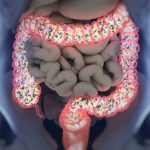By Bonnie Jenkins, Advanced Natural Wellness
Here are some sobering statistics: More than 100,000 Americans will be diagnosed with colon cancer in 2009. Of those, about half will die from the disease, making it the third most prevalent cause of all cancer deaths. But it doesn’t have to be that way.
Why do so many people die of colon cancer? Because, unlike some other cancers, there are no symptoms until it has reached the advanced stages. But colon cancer has an excellent cure rate if it’s caught early. That’s why it’s so very important to get a colonoscopy shortly after you turn 50.
Are You At Risk?
So what’s your risk? Factors beyond your control include advancing age and having a family history of colon cancer or polyps. But there are a number of things you can do to lower your risk of colon cancer. If you smoke, quit. And keep a lid on the amount of alcohol you consume. More than two alcoholic beverages a day may trigger colon cancer in people with a family history of the disease.
Couch potatoes are also at a higher risk. After all, living a sedentary lifestyle allows waste to hang around in your colon longer. Exercise, on the other hand, speeds the passage of intestinal contents, limiting the amount of time potential carcinogens come in contact with the large intestine. It also decreases circulating insulin levels thought to stimulate tumor growth.
Staying physically active also aids weight management. Women and men double their risk of colon cancer if their waists measure more than 32 and 36 inches respectively. Why? Overweight people are typically less active, often secrete excessive insulin and may consume too many of the “wrong” types of food.
Eat Colon-Happy Food
MD Exposes the Hidden Danger to Your Eyes

When your eyesight starts to fail, it's a real problem. Suddenly you can't go to the grocery store... you can't get to the doctor if you have an emergency... you can't meet your friends for dinner…
Your "regular" doctor doesn't have time to keep up with the latest research. And the same goes for eye doctors. They go to school to learn how to fit you for glasses and contacts, but have no way of preventing the damage and loss of eyesight that threatens your freedom and independence.
Let me show you something that explains a LOT about how your eyes work.
In my FREE Special Report, I'll show you a HUGE, untapped resource for your eyes that safely and naturally restores clear, effortless eyesight.
Click here to get started...
Until a few years ago, doctors recommended a high-fiber diet to reduce the risk of developing colon cancer. But recent studies can’t agree on whether fiber works or not – and if it does, which type of fiber is best.
Even if fiber isn’t the holy grail of colon cancer prevention, experts still recommend a fiber-rich diet of plant foods. Why? Because there are beneficial phytochemicals tucked away in these foods, including antioxidants that thwart cell damage.
Of course, eating a diet high in fiber does soften the stool and helps move waste through the colon. But don’t be fooled by these so-called “high-fiber” foods. Many contain isolated fibers like polydextrose or maltodextrin that don’t offer any real health benefits. Opt instead for fiber-rich complex carbohydrates like whole grains, fruits and vegetables. And try to eat seven to nine servings per day.
Adding fresh fruits, vegetables and whole grains to your diet is only half the battle. It’s also a good idea to reduce the amount of red meat you eat. Red meat is packed with saturated fat – a proven culprit in colon cancer. Processed and heavily cooked meats also boost your risk, because they can contain carcinogens like nitrates and heterocyclic amines. Instead, plan your menu around lean poultry and fish. The omega-3 fatty acids in fish might actually slow or prevent tumor growth. The monounsaturated fat in olive oil may also be protective by decreasing deoxycholic acid, a bile salt that can trigger tumor formation.
Super Supplements
Folic acid shines as a shield against colon cancer. Whether in the natural food form (as folate) or in supplemental form, this B vitamin appears to guard against DNA damage that can cause cancer. The protection offered may be greatest for those with a family history of the disease.
Studies show that, as folic acid levels increase, the risk of precancerous polyps in the colon and colon cancer itself decrease. In one study, women who had taken folic acid supplements had a 75 percent reduction in the risk of colon cancer, compared with women who didn’t supplement – but only when they had been supplementing with folic acid for more than 15 years. In another report, the association between dietary folate and protection from precancerous polyps grew much stronger with the addition of a folic acid supplement.
Carotenoids also play a critical role in preventing colon cancer. Higher intakes of two carotenoids in particular, lycopene and lutein, seem to lower risk. By acting as antioxidants, they protect the cell membranes that line the colon from free-radical damage. And new evidence suggests that lycopene directly inhibits the growth of colon cancer cells. A recent Harvard study found that taking 6.5 mg. of lycopene daily significantly lowers the risk of cancer. And taking 6 mg. of lutein every day not only reduces cellular damage in the colon, it also promotes better vision.
Are You Suffering From...
- Love handles and a pot belly
- Romance that isn't what it used to
- Forgetfulness and inattention
- Low (or no) strength and endurance
- A sex drive that's shifted into neutral...or worse
If so...you may have Mature Male Burnout. Click here to discover more about this unique condition and what you can do about it.
Finally, taking 1,200 to 1,500 mg. of calcium has been linked to lower colon cancer rates. Researchers suspect that calcium binds with bile acids, preventing abnormal cell growth. Be sure you get ample vitamin D too, to enhance calcium absorption.
One Last Thing …
According to the experts, you need to get a colonoscopy every 10 years. Yes, I know – getting ready for a colonoscopy is no picnic. But there are some good alternatives that don’t involve drinking a gallon of nasty-tasting medicine to clean out your system. There is now a tablet you can take that is much more pleasant.
If your risk is low, you might ask you doctor about a virtual colonoscopy. A virtual colonoscopy is non-invasive and finds 90 percent of all polyps (growths in the colon that are considered pre-cancerous). Of course, the downside is that if polyps are found, you still need to have a regular colonoscopy to remove them.
Whichever type of colonoscopy you and your doctor settle on, the important thing is that you get one. Colonoscopies are the gold standard in colon cancer prevention – and suffering through a bit of temporary discomfort sure beats dying of this very preventable disease.
Research Brief …
Want to improve your memory? Take a nap! New research suggests that taking a nap might boost a sophisticated kind of memory that helps us see the big picture and sparks our creativity. Getting good-quality sleep – whether it’s a nap or the recommended seven to eight hours a night – helps the brain process memories so they stick.
Particularly important is “slow-wave sleep,” a period of very deep sleep that comes earlier than better-known REM sleep, or dreaming time. It’s possible that our brains keep working during that time to solve problems and come up with new ideas. To test the idea, neuroscientists at City University of New York devised a simple test to document relational memory, where the brain puts together separately learned facts in new ways.
First, they taught 20 English-speaking college students lists of Chinese words spelled with two characters – such as sister, mother, maid. Then half the students took a nap. Upon awakening, they took a multiple-choice test of Chinese words they’d never seen before. The nappers did much better at automatically recognizing that the first two characters in the words they’d memorized earlier always meant the same thing – female, for example. So they also were more likely than non-nappers to choose a new word containing that character which meant “princess” and not “ape.”
In another study, Wisconsin researchers briefly interrupted nighttime slow-wave sleep by playing a beep – just loudly enough to disturb sleep but not awaken – and found that those people couldn’t remember a task they’d learned the day before as well as people whose slow-wave sleep wasn’t disrupted.
So if you’re trying to master a new skill – or just want to remember where you left the car keys – find a quiet corner and catch some zzz’s. I can’t think of a nicer memory booster!
References:
Giovannucci E, Stampfer MJ, Colditz GA, et al. Multivitamin use, folate, and colon cancer in women in the Nurses’ Health Study. Annals of Internal Medicine. 1998;129:517–524.
Paetau I, Rao D, Wiley ER, et al. Carotenoids in human buccal mucosa cells after 4 wk of supplementation with tomato juice or lycopene supplements. American Journal of Clinical Nutrition. 1999;70:490–494.
Peters U, Chatterjee N, McGlynn KA, et al. “Calcium intake and colorectal adenoma in a US colorectal cancer early detection program.” American Journal of Clinical Nutrition. 2004;80:1358-1365.
Rex DK, Schwartz H, Goldstein M, et al. Safety and colon-cleansing efficacy of a new residue-free formulation of sodium phosphate tablets. American Journal of Gastroenterology. 2006;101:2594-2604.
Schatzkin A, Mouw T, Park Y, et al. “Dietary fiber and whole-grain consumption in relation to colorectal cancer in the NIH-AARP Diet and Health Study.” American Journal of Clinical Nutrition. 2007;85:1353-1360.
Stenuit P, Kerkhofs M. “Effects of sleep restriction on cognition in women.” Biological Psychology. 2008;77:81-88.






